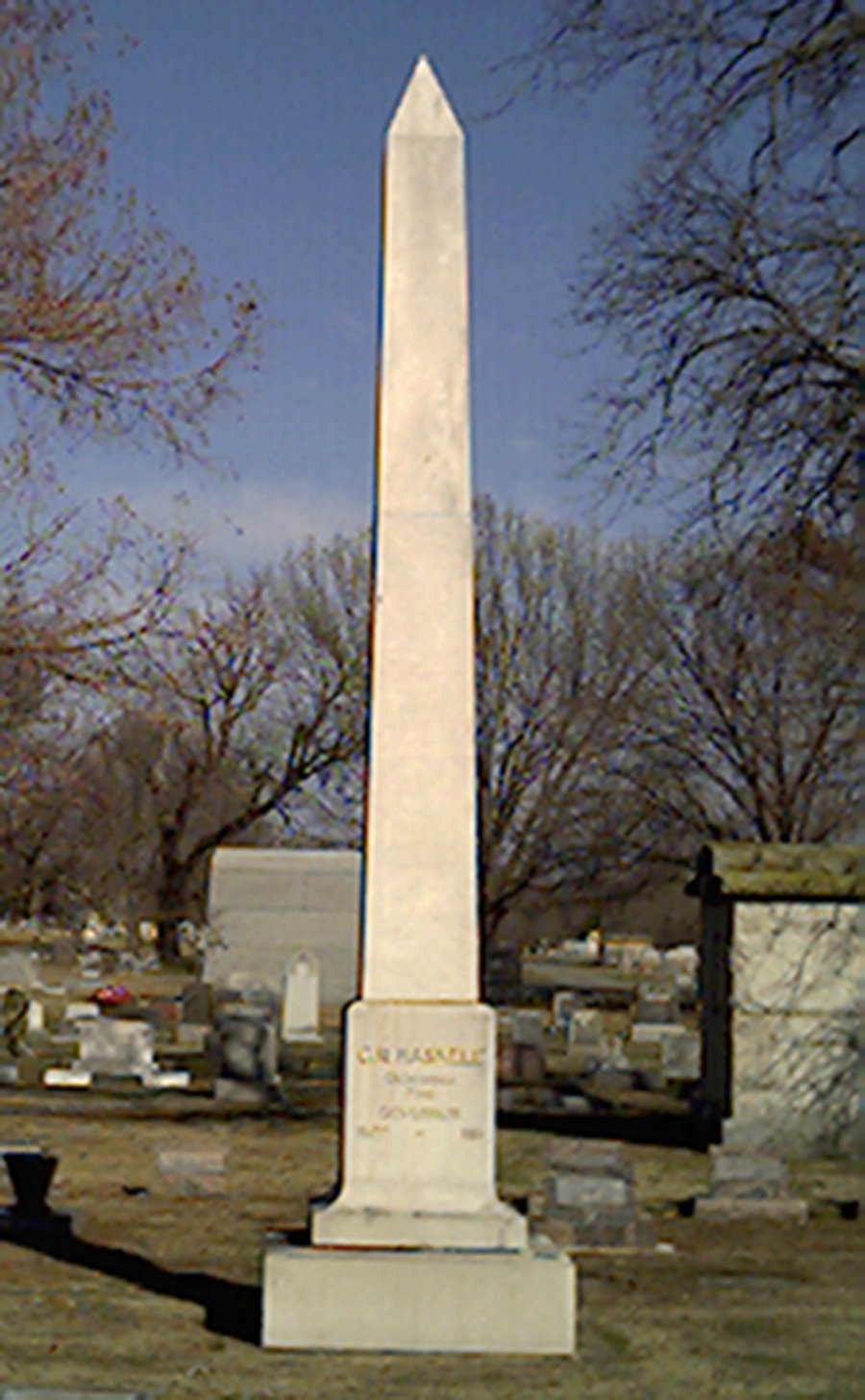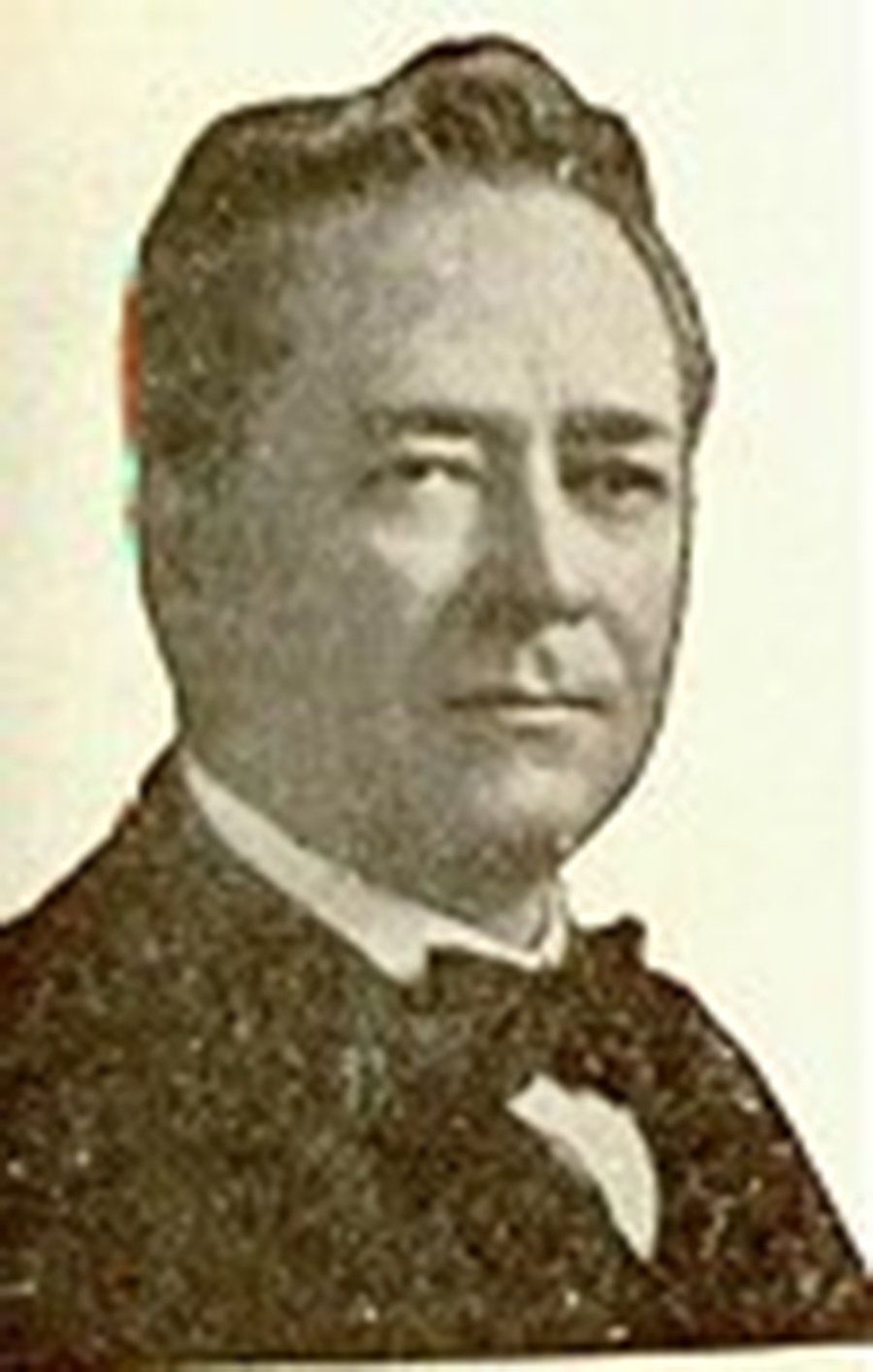Charles Nathaniel Haskell
- Born: 13 Mar 1860, West Leipsic, Liberty Township, Putnam County, Ohio
- Marriage (1): Lucie Violatra Pomeroy on 11 Oct 1881 in Ottawa Township, Putman County, Ohio
- Marriage (2): Lillian Elizabeth Gallup on 4 Sep 1889 in Ottawa Township, Putman County, Ohio
- Died: 5 Jul 1933, Skirvin Hotel, Oklahoma City, Oklahoma at age 73
- Buried: Green Hill Cemetery, Muskogee, Oklahoma

 General Notes: General Notes:
Information from the Oklahoma State web page
www.governor.state.ok.us/govlist.htm
Charles Nathaniel Haskell, Democrat. Served from 1907 to 1911. Oklahoma's first State Governor was born March 13, 1860, in Putman (Putnam) County, Ohio. He was educated as a lawyer, admitted to the Ohio Bar in 1881, and began practice in Ottawa, Ohio. In 1901, he moved to Muskogee, Indian Territory, where he added to his law practice the promotion of railroads. He was a leader in the Oklahoma Constitutional Convention in 1906. After his term as Governor, from November 16, 1907 to January 9, 1911, he engaged in the oil business. He died July 5, 1933, and is buried in Muskogee.
He constructed two railroads while living in Ottawa, Putnam County, Ohio. His first was the Findlay, Fort Wayne and Western; started in 1888, finished in 1895 and sold to the C.H. and D. in 1902. The second was the D. T. & I. railroad constructed in 1895-1899.
More information from OkGenWeb
C.N. Haskell's father died when Charles was three years of age, at the age of ten he went to live with a couple named Miller where he lived until the age of twenty years of age. Though Mr Miller was a school teacher, Charles was unable to attend school regularly, but Mrs. Miller taught him at home. At the age of seventeen he passed the examination for a teacher's certificate. Haskell taught school until after he was admitted to the bar in December 6, 1880 at the age of 20. When his school term ended, he moved to Ottawa, Ohio to practice law. He married Lucie Pomeroy, daughter of a prominent Ottawa family, on October 11, 1881. Lucie Haskell died in March, 1888, leaving Haskell with three children.
Haskell remarried Lillian Elizaberth Gallup in 1889, the couple had three children.
His energy eventually brought him into Oklahoma politics, where he became a commanding figure in the Oklahoma Constitutional Convention in 1906. In March, 1907, Haskell began publication of The New State Tribune which brought him even more prominence. On Nov. 16, 1907 President Roosevelt signed the proclamation admitting Oklahoma as a state. The same day Charles Nathaniel Haskell was inaugurated as the first Governor of the State of Oklahoma.
The Haskells moved to Guthrie, living in the Royal Hotel. Haskell's daughter, Frances married the editor of the Guthrie Leader, Leslie G. Niblock in March 1909.
In 1933 Haskell suffered a stroke, from which he never fully recovered. He died three months later of pneumonia on July 5, in the Skirvin Hotel in Oklahoma City at the age of seventy-three.
The first capital city of Oklahoma was Guthrie.
The New State Tribune was located in Muskogee, Oklahoma.

 Noted events in his life were: Noted events in his life were:
1. Alt. Death: Oklahoma City, Oklahoma. Alternate death location for Charles Nathaniel Haskell.

2. Cemetery: Green Hill Cemetery, Muskogee, Oklahoma. Green Hill Cemetery is located at 1500 North York Street, Muskogee, OK 74403.
The cemetery telephone number is 918-682-0331.
Charles Haskell is buried in block 123-0, Lot 003-0, space 001-0. The cemetery records also state that he died of Pneumonia in Oklahoma City, Oklahoma. The plot purchaser's name was Mrs. C.N. Haskell.

Charles married Lucie Violatra Pomeroy on 11 Oct 1881 in Ottawa Township, Putman County, Ohio. (Lucie Violatra Pomeroy was born on 27 Jan 1859 in Ottawa Township, Putman County, Ohio, died on 28 Mar 1888 in Ottawa Township, Putman County, Ohio and was buried in Pomeroy Cemetery, Ottawa, Putnam, Ohio.)

Charles next married Lillian Elizabeth Gallup on 4 Sep 1889 in Ottawa Township, Putman County, Ohio. (Lillian Elizabeth Gallup was born on 12 Dec 1862 in Ottawa Township, Putman County, Ohio, died on 13 Jul 1940 in San Antonio, Bexar County, Texas and was buried in Green Hill Cemetery, Muskogee, Oklahoma.)
|


 General Notes:
General Notes: